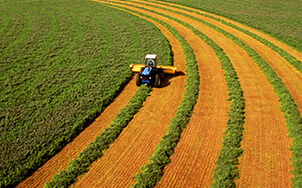Saving the world's forests using AI
Trees are the guardians of the planet. They provide soil stabilization, a refuge for plants and animals, not to mention the precious oxygen we breathe. Without trees, the world as we know it — more than 30 percent of which is covered in forest — could not persist.
But our vital forests are under serious threat from natural disasters, disease, human activity and climate change. We lose the equivalent of 27 soccer fields of trees every minute. Stopping deforestation, according to a special UN report, could provide up to 30 percent of the “climate solution” to hold global warming at 1.5 degrees Celsius. We need trees — and they need us to drastically rethink how to solve for deforestation.
There is hope on the horizon, thanks to a series of advanced technologies that make protecting forests more efficient than ever before. The folks at byteLAKE, a Polish company specializing in building AI and high-power computing systems, have developed a program called Ewa Guard in collaboration with Lenovo. Ewa, which means “Eve” in Polish and here stands for Earth Water Air Guard, is an artificial intelligence-powered system that enables the counting of trees without ever having to step foot in the forest. Its mission? Exploring the ways we can monitor the health of our forests with speed and efficiency before it’s too late for them.
“When people want to plant new trees, they must physically go into the field every few weeks to manually count the trees and to assess how many young trees are surviving,” said Marcin Rojek, the co-founder of byteLAKE and the co-creator of Ewa Guard.
With help from Lenovo, what was once a slow, boots-on-the-ground process is now a speedy, automated feat of engineering. This advanced technology uses high-resolution drone video to train computers how to visually identify healthy, young trees which makes protecting forests faster, more accurate, and life-saving for these fragile ecosystems.
It’s difficult to teach a computer to identify a tree, but thanks to the partnership with Lenovo, the process is faster than ever. Using a cluster of Lenovo high-performance ThinkSystem servers, Ewa Guard cut the training time down from two weeks to an astounding six hours. If the configuration is expanded, that time could be reduced even further, meaning the technology can scale to even greater heights.
“Lenovo has a ready-made solution in their AI Innovation Lab that accelerates complex workloads radically, from weeks to hours,” Rojek said. That radical acceleration has proven vital to the project, especially as it continues to scale.
FEATURED SOLUTIONS
Mariusz Kolanko, co-founder of byteLAKE and co-creator of Ewa Guard, describes his company’s relationship with Lenovo as a “perfect marriage.” “Because they are open for innovation, they make a great partner for us.”
Ewa Guard is ready for implementation, and byteLAKE is seeking partners who need the tool most: forest managers, municipalities, and environmental organizations. Eventually, the technology can be used to identify the exact species of tree, as well as separate the sick trees from the healthy to glean hotspots where trees are especially susceptible to die-offs and illness.
How effectively you identify a problem determines how well you can solve it. With Ewa Guard’s innovations, we may finally have the tools necessary to give back to the forests that have already given us so much. The clock is ticking for our planet’s forest as 46 percent of forests have been felled since humans started logging. Ewa Guard and Lenovo, says Rojek, “are working together to empower solutions for this powerful mission.”
















